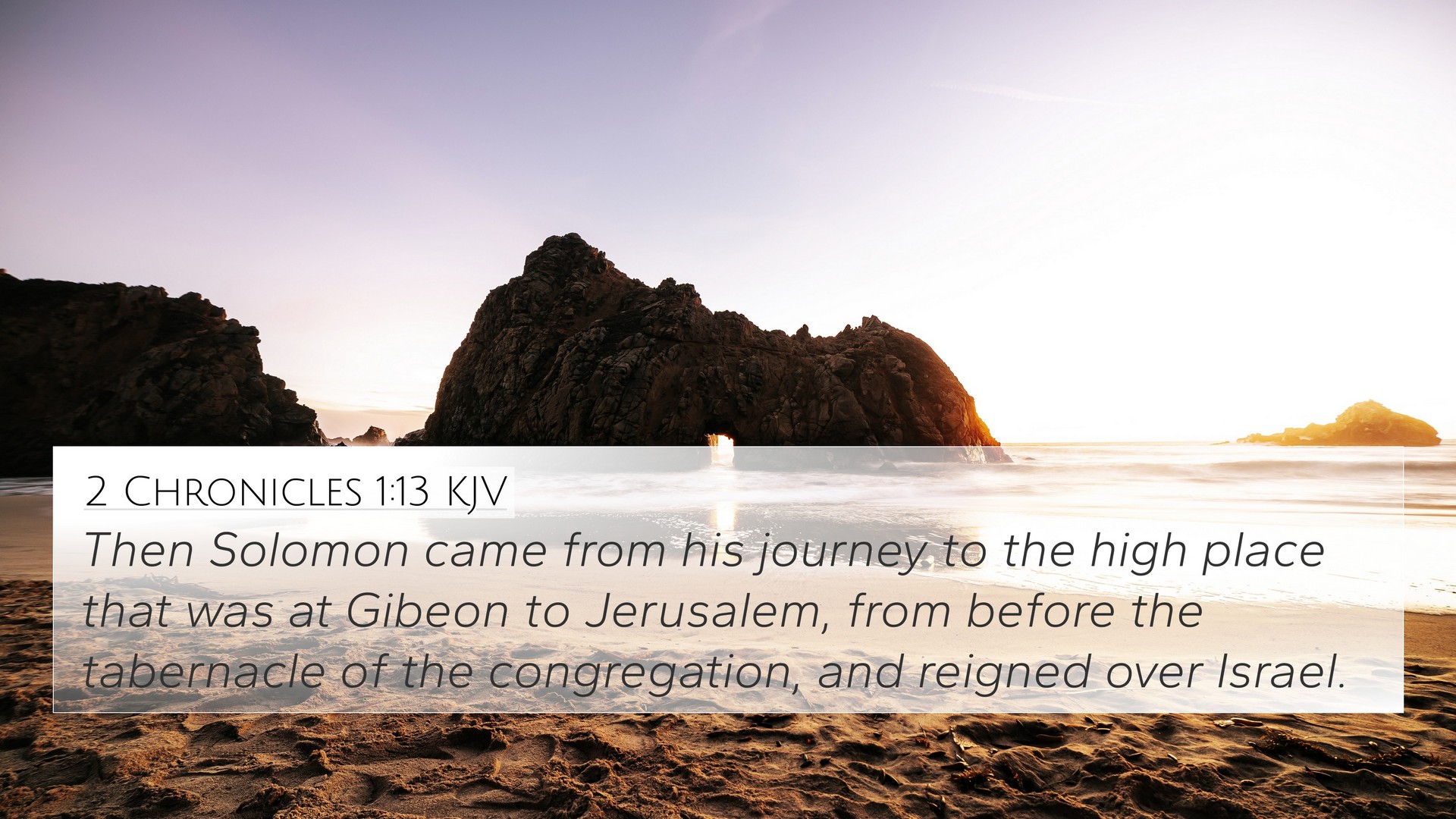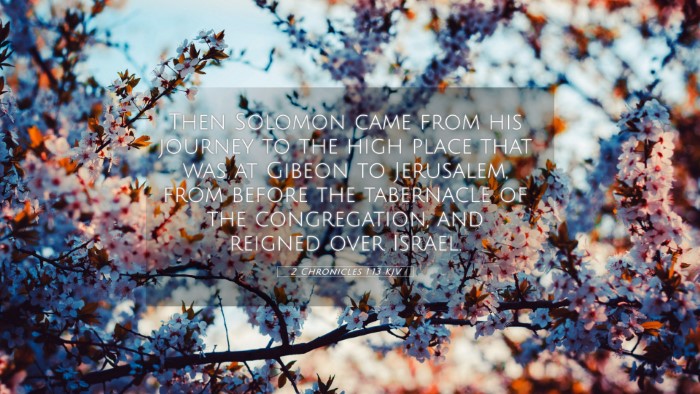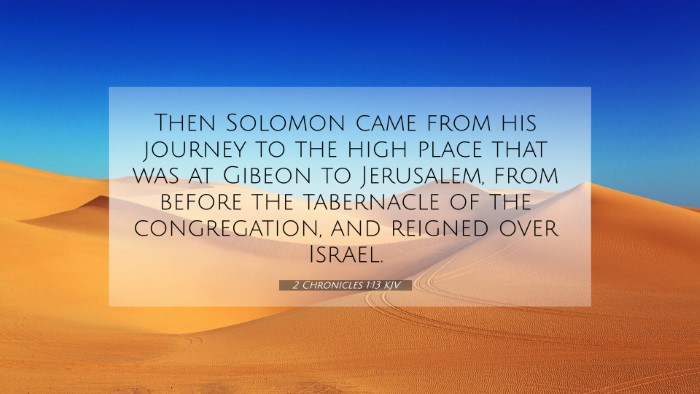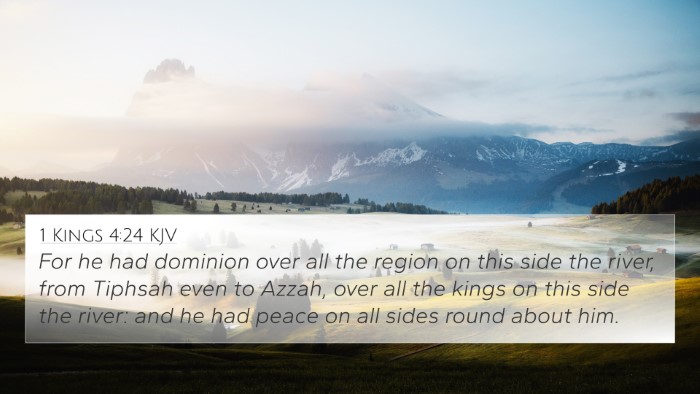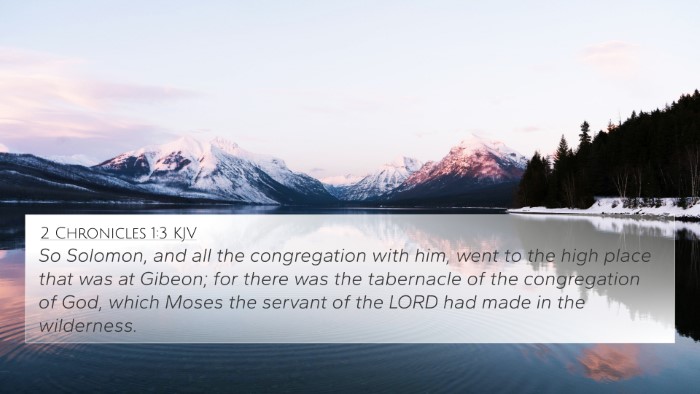Understanding 2 Chronicles 1:13
Verse: "So Solomon came to Jerusalem from the high place that was at Gibeon, and he reigned over Israel." (2 Chronicles 1:13)
Summary of 2 Chronicles 1:13
The verse depicts a significant moment in Solomon's reign as King of Israel. It highlights his return to Jerusalem after offering sacrifices at Gibeon, marking a transition in his leadership from a state of seeking divine guidance to establishing his authority over Israel.
Commentary Insights
This verse is rich with theological and historical meaning. The following insights are compiled from public domain commentaries by Matthew Henry, Albert Barnes, and Adam Clarke:
- Matthew Henry's Commentary:
Henry emphasizes the importance of Solomon’s journey from Gibeon to Jerusalem, illustrating his commitment to the worship of God and governance. He notes that Gibeon was a high place, indicative of earlier worship practices before the temple was built. Solomon’s return signifies the consolidation of his reign and the acknowledgment of God’s sovereignty.
- Albert Barnes' Notes:
Barnes points out that this verse sets the stage for understanding Solomon's reign. He notes the geographical significance of Gibeon and Jerusalem, illustrating a connection between where Solomon sought wisdom and where he would rule. Solomon's willingness to seek divine counsel at Gibeon establishes a theme of reliance on God's guidance throughout his reign.
- Adam Clarke’s Commentary:
Clarke discusses the implications of Solomon's actions as reflective of a humble ruler who sought divine favor. His reference to the “high place” at Gibeon underlines Solomon's initial dedication to God. Clarke also highlights that Jerusalem would become the center of worship, emphasizing God’s intention for His dwelling with His people.
Thematic Connections and Bible Cross-References
2 Chronicles 1:13 connects with several other scriptures that reflect its themes and lessons:
- 1 Kings 3:15: This verse describes Solomon’s return to Jerusalem and his worship after receiving divine wisdom.
- 2 Chronicles 1:1: Chronicles the beginning of Solomon's reign, highlighting God's support as he ascended the throne.
- Deuteronomy 17:14-20: Discusses the characteristics of a king and the importance of devotion to God, pertaining to Solomon’s leadership style.
- Exodus 34:24: A reminder of God’s promise to protect those who worship Him faithfully, relevant to Solomon’s actions post-worship at Gibeon.
- Psalm 127:1: This verse speaks to the necessity of divine involvement in all human endeavors, echoing the theme found in Solomon's decision to seek wisdom.
- 1 Chronicles 29:24: Highlights the allegiance of Israel to Solomon, reflecting the people's recognition of God’s choice of Solomon as king.
- Proverbs 1:7: “The fear of the Lord is the beginning of knowledge,” relates to Solomon’s initial seeking of wisdom, setting a precedent for wise leadership.
- Ecclesiastes 12:13-14: Captures the conclusion of Solomon’s later reflections on wisdom, duty, and the importance of fearing God.
- Isaiah 9:6-7: Offers prophetic insight into the kind of ruler God desires, drawing parallels with Solomon’s reign.
- Romans 13:1: Connects the understanding of authority and governance under God, relevant for interpreting Solomon’s kingship.
Applying the Insights
The lesson from 2 Chronicles 1:13 points to the necessity of seeking wisdom from God and the importance of holy places of worship. Solomon’s leadership journey demonstrates:
- The importance of establishing a strong spiritual foundation for leadership.
- The significance of returning to one's roots in faith during times of transition.
- Cultivating a reliance on divine wisdom as opposed to human understanding.
- Recognizing the centrality of worship and reverence in governance and decision-making.
Cross-Referencing Methods for Deeper Study
For those studying this verse and its connections, employing various tools and methods for cross-referencing can enhance understanding:
- Bible Concordance: Use specific concordances to identify words related to worship, wisdom, and kingship to find additional verses.
- Cross-Reference Bible Study: Utilize Bibles with cross-reference systems to navigate related scriptures quickly.
- Thematic Bible Study: Explore thematic connections surrounding kingship and wisdom across various books of the Bible.
- Bible Chain References: Follow linked verses through themes of leadership and divine appointment for deeper insights.
Conclusion
In summary, 2 Chronicles 1:13 serves as a pivot point in Solomon's reign, emphasizing themes of worship, divine guidance, and the significance of Jerusalem as the heart of Israel’s faith and governance. By exploring cross-references and employing biblical study tools, believers can uncover rich layers of meaning, fostering a deeper understanding of God’s word and its application to life today.
